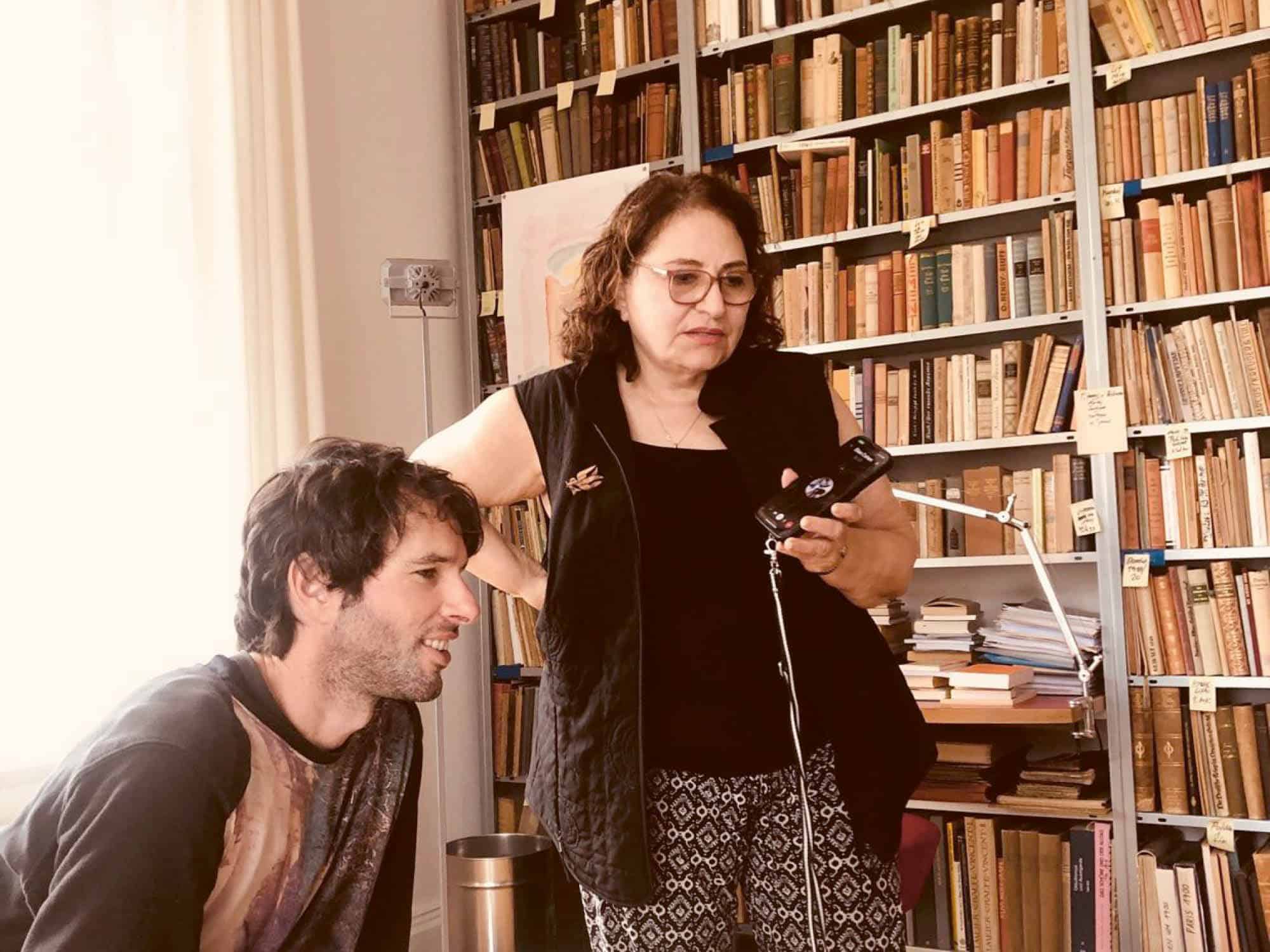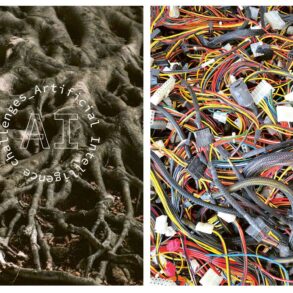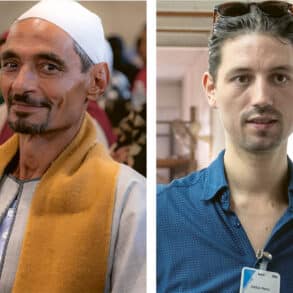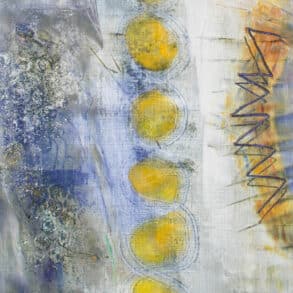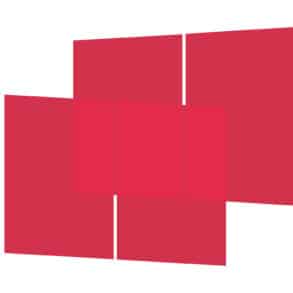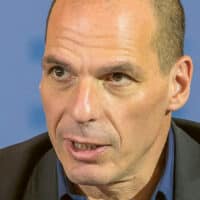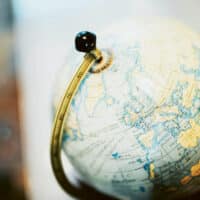In mid-October, an opportunity, quite spontaneously, arose to bring the young Israeli Omer and the Palestinian Faten, thirty years his senior, together.1 We witnessed a quiet, momentous event.
Omer Eilam It all started a few weeks ago when I sent my poem Israel to the editors of the Goetheanum Weekly. Gilda wrote back to say that she would like to include the poem in a short piece she was writing about Faten. She suggested that the three of us meet for a conversation to shed light on the current events and history that has led up to this moment from an Israeli, Palestinian, and German perspective. At the time, I was visiting my family in Israel, and Faten was in Bethlehem. It is ironic and sad that we were so close geographically, but because of the political reality, we could not meet in person: I am not allowed in Bethlehem, and she is not allowed in Israel. So we had to wait for another opportunity. This came totally by chance when Gilda was visiting Berlin and discovered that Faten was there for a lecture tour in Germany. We met in the Kulturimpuls Foundation, at the home of Bodo von Plato, my former teacher at the Goetheanum, and a dear friend. Two other women, who were there as part of a study group on aesthetics, joined us.
When I entered, everyone was already sitting at a big table with an assortment of pastries, including small brownies that Gilda had baked, which reminded me of the ones my mother made when I was young. After a quick round of introductions, we dove into deep waters. Faten was asked if she could explain the relationship between “average” Palestinians and Hamas. It is one of many questions where, in order to give a meaningful answer, we must trace the steps backward ad infinitum. And so she did, describing in great detail, and for well over an hour, the ethnic layers of Israeli society, the connection between Arab and European Jews, the Oslo accords, the murder of Yitzhak Rabin, the disengagement from Gaza and the takeover by Hamas, the limited nature of democracy in the West Bank, and the dynamics between Jewish settlers and their Palestinian neighbors. During her speech, I felt a strong urge to stop her, not because I disagreed with the things she was saying but rather because I felt that we were just reinforcing established thought patterns and sinking deeper into the mud. Yet something stopped me from doing that, an inner voice that said: “Now you just listen.” And so I did.
When she finished, some of us felt overwhelmed by the sheer amount of information and powerless to imagine a way out of this calamity. Gilda and Bodo asked where all this external violence meets and affects us inwardly. My answer came out of the recent assassination of the Hezbollah leader Hassan Nasrallah and how Prime Minister Netanyahu said, in response, that this killing “settles the score with the one responsible for the murder of countless Israelis…”. The motive for the killing didn’t come out of cold analysis based on security reasons but rather pure revenge. This revenge is not targeted merely at Nasrallah and does not stop with him. It continues its journey backward in time, revisiting the Second Intifada, where it wants to avenge all the Israelis who died in suicide bombings, and the Yom Kippur War, where it wants to reclaim the illusion of Israeli military supremacy, which was then shattered… But it does not stop there either. It goes further back into the time of Nazi Germany and the Holocaust, where the blood of millions of people sent to the gas chambers nourishes its own thirst for blood. And it continues its journey into the deep past through centuries and millennia of antisemitism.
Yet, this karmic wave of violence and revenge that crushes us at specific moments in history is not unique to the Jewish people. Muslims and Christians know it too when living as minorities, as do Africans and Indigenous people, and the list goes on. This wave is a universal one, enshrined deep within our consciousness, and manifesting itself in unique ways throughout history. I imagine it again, this time not going backward but coming towards me, confronting me with all of its historical weight. Can I face the wave and let it wash over me while staying upright and not collapsing under its weight? Can I decide that this karma stops with me?
Then I talked about my friend Aviv, who helped me so much, years ago when I was facing severe depression, and who is now in Israel trying to organize healing ceremonies for Israelis and Palestinians. And Faten told me about her friend Elias from Gush Etzion, who is engaged in an initiative to promote the idea of a Jewish-Palestinian federation as a potential solution to the conflict. He said this idea is so difficult to “sell” because it is fundamentally based on mutual trust which is direly lacking these days. In a news piece that I saw on German national television a few days ago, Israelis and Palestinians were interviewed and asked about their prospects for the future. Their answers were practically identical: the Israelis said that after October 7th, they cannot trust Palestinians anymore. And the Palestinians said that after what they did in Gaza, they cannot trust Israelis anymore. Perhaps that is the reason why we all gathered here in Berlin—Israelis, Palestinians, and Germans—to build the trust that there are still people on both sides who are devoted to peace and willing to work for it.
At the end of the meeting, Faten and I hugged. She took off the brooch in the shape of the dove that brings the olive branch, which she was wearing on her sweater, and pinned it to my shirt. The following Saturday, I sang with my choir at a peace concert in the Kaiser-Wilhelm-Gedächtniskirche. I wore Faten’s pin.
Hope for Survival
Faten Mukarker The meeting with Omer was really good for me. It’s good to meet people who still believe in something like the future and reconciliation. Such people have become rare in Israel and Palestine. And it makes a difference when you sit opposite a person, face to face. I usually never meet Israelis. In Germany, I often hear that things will never work out for us in Israel/Palestine. We who live there can’t afford to have this attitude because we need hope not just to live but to survive. The hatred that has been created, the sadness about what this conflict has done to people, is unbelievable. The worst thing is what we are doing to our youth on both sides. Some say that we need to talk to the other side. But there are many who no longer want to. I would never have dreamed that the world would allow what is now happening in Gaza. This conflict shows me the inhumanity of this world and its double standards.
It wasn’t easy for me to meet Omer. I didn’t even know who he was—an Israeli: that immediately conjures up images. I’m sure it’s the same for him. But I wanted to meet him and hear whether there are still Israelis who see that innocent blood is flowing in Gaza. And he sees it.
At the end, we hugged, and he moved my heart with the way he sat there and what he said. After all, I’m only human. He is a ray of hope. But a ray of light is like a moment. In all this darkness, he is a little light. But we need light. Netanyahu said that we are the sons of darkness, and they are the sons of light. That afternoon, we were two little lights in the night. My people and their people need healing. And if I don’t start with myself, it won’t happen. But for that to happen, the killing must stop.
Thank you, Omer, for being here. We must not only perceive ourselves as a grounding. We must show our people that there are also people on the other side who have remained human.
Development in the Impossible
Bodo von Plato How is it possible to live with or resolve a situation that has grown over time in such a way that it is now deadly and without any prospect? In Israel, experience, narrative, and interests close off all viable development—from the very human and personal to the global political. No matter which of these levels we find ourselves on, an opening will probably, ultimately, find its measure in the encounter from person to person. And in a third.
Faten and Omer could not meet in Israel but in Germany, in Berlin, at the Kulturimpuls Foundation, which is dedicated to development research. Before they first arrived, it seemed possible to me that they could meet and understand each other despite the historical and current circumstances. Once they were here and the story began, I believed that less and less. The distance seemed too great, the generation gap too deep, the strangeness too tragic.
Only when the listeners, those not directly affected, the witnesses, expressed their longing for the seemingly impossible, their longing for something beyond, for something human, did everything change. Not just encounters and understanding, but care and connection became possible.
The responsibility for development in the impossible seems to lie with the others in their witnessing, which makes itself felt.
Gilda Bartel I can’t say what Germany’s role was in this meeting. I was there as a human being, not as a German. But when I think about it, I would like to belong to a country that is committed to peace, that refuses to supply arms, no matter to which part of the world. I would like to belong to a nation of peacemakers. This is where the word “nationality” expands, and perhaps the word “nation” no longer even applies. Is this already a threshold to a community that goes beyond earthly blood ties and entrusts itself to uprightness and sincerity? We leave traces on each other. We form new continents.
Israel
He was just a child
Born of necessity
Carrying centuries-old scars
So deep
He wouldn’t recognize Himself without them.
Old wounds
They tend to itch
Inviting hungry nails
Scraping an all too sensitive skin.
Blood flowing
and gushing
and drowning
Any hope for peace.
With one finger He wipes a tear
With the other He pulls a thousand triggers.
The shudder
of the wing
of the aircraft as it drops the bomb
He is already too insensitive to feel.
His Brother’s blood is screaming from the soil
But His own blood screams louder.
Funny thing about blood…
The right amount lets us know we’re human.
Too much turns us into killing machines.
They say that peace sells…
But He knows His scars sell more.
And so He uses them
To rationalize His entire existence.
Yet the market today is all about fresh blood
And while people are tired of fighting
They are not yet tired of selling weapons.
And He is all too eager to buy.
So now He is the neighbourhood bully.
They cannot see He hurts;
He cannot see He is hurting someone else…
Israel,
you endured great suffering
and inflicted them too.
In this twilight hour,
may your pain transform you,
may it break your heart
and reach deep into your soul
to find the seed of eternal love
extending to all
through all
in all…
May you be free to end this cycle of violence
and choose the road to peace.
Omer Eilam
Translation Laura Liska
Image Faten Mukarker (right) and Omer Eilam. Photo: Bodo von Plato
Footnotes
- See “In the Twilight Hours” in the Goetheanum Weekly #42, Oct. 16, 2024.

